After the appearance of growths on the body, patients almost never wonder whether it is necessary to remove papillomas on the body. The answer is already obvious, because they spoil the appearance of a person and can degenerate into cancer. That is why most patients who have warts on their bodies are worried about this and wonder how to remove the papilloma and get rid of the papillomavirus?
To date, there are different ways to remove papillomas. They are divided into cosmetic procedures and surgical operations.The choice of method in each case depends entirely on the size of the papilloma, as well as the strain of the virus that provoked the growth of the neoplasm.And the attending physician should choose a method for removing growths after conducting various studies and assessing the dynamics of the pathological process. Before removing papillomas on the body, the patient must undergo a PCR study. It will show whether there are oncogenic viruses in the patient's body or not.
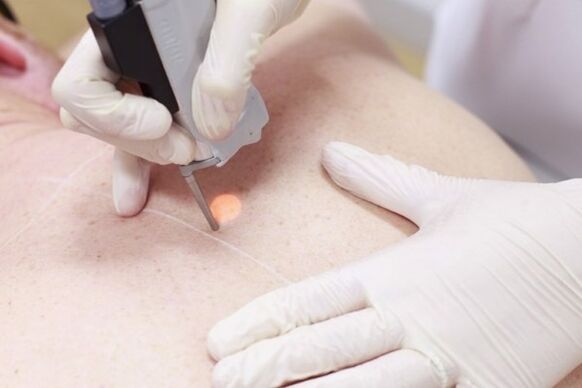
Electrocoagulation
Electrocoagulation is a procedure that allows you to quickly get rid of growths. During its implementation, the surgeon cauterizes the neoplasms with high-frequency current. The main advantages of electrocoagulation include the fact that the doctor can control the depth of exposure and reduce even the largest neoplasms.
Under the influence of high-frequency current, the proteins in the neoplasm coagulate, and the warts begin to collapse. It is important to say that electrocoagulation increases the chances of getting rid of them once and for all, because this procedure indirectly eliminates the causes of the disease - the vessels that feed the neoplasm are damaged.
With electrocoagulation, tissue infection is excluded, and the risk of bleeding is significantly reduced.
During electrocoagulation, the patient may experience pain, therefore, before removing the papilloma on the body in this way, the doctor gives the patient local anesthesia. Having learned all the advantages of electrocoagulation, people no longer doubt whether it is necessary to remove papillomas.
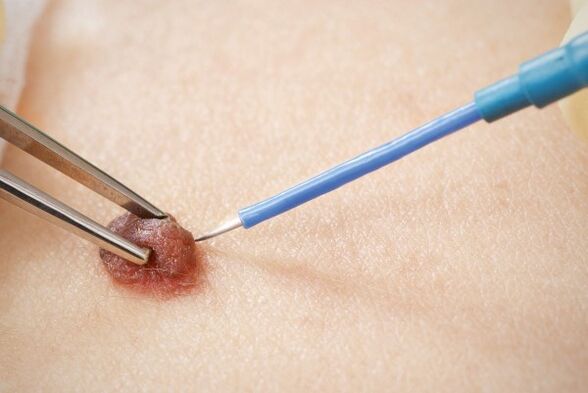
Radio wave wart removal
Radio wave removal of papillomas is a procedure during which a specialist performs an atraumatic incision of the neoplasm and then disposes of it. In this case, soft tissue coagulation occurs.
Is it dangerous to remove papillomas in this way? Absolutely not. Recently, this procedure has become incredibly popular. This is one of the most accurate methods for removing growths. It never affects healthy, virus-free tissue. After radio wave treatment, there are no scars or scars on the body, there are not even slight signs of burns.
At the moment, these manipulations are carried out using a radio wave apparatus. It is incredibly effective and completely safe. People call it a radio knife. This device converts electric current into radio waves and dissects pathological areas with the help of heat that they themselves produce.
This device is used in gynecological practice, helps to get rid of genital warts and cervical dysplasia. Radioknife can be used to treat both very young girls and adults who have given birth to women. Before removing papillomas, a woman must be biopsied.
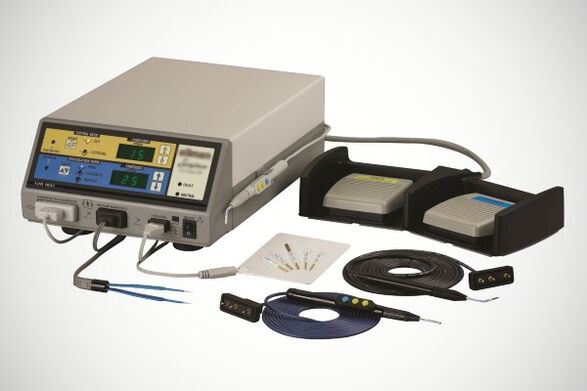
Laser treatment of warts
Laser treatment of papillomas is one of the most modern and popular methods of removing growths at the moment. During this procedure, the doctor directs a laser at the wart, as a result of which it begins to warm up strongly and eventually evaporates.
As with electrocoagulation during laser treatment, injured vessels are sealed, as a result of which the risk of bleeding, infection and inflammation is significantly reduced, and the rehabilitation period is reduced. After laser removal of warts, scars or scars do not remain on the skin.
This procedure can cause pain, therefore, before removing papillomas in this way, doctors give the patient local anesthesia. Before removing papillomas on the body, the doctor applies an anesthetic (cream or spray).
Rehabilitation after such a procedure lasts from 5 to 8 days (depending on the size of the neoplasm and the individual characteristics of the body).
The laser, as well as the radioknife, can be used in gynecologists in order to reduce genital warts, eliminate dysplasia of the cervical epithelium.
Before ridding her body of papillomas forever, the patient must also undergo a colposcopy. Before treatment, women are not given local anesthesia. This is due to the fact that there are no nerve endings on the cervix. About how quickly the procedure will pass in a particular case, you should ask your doctor.
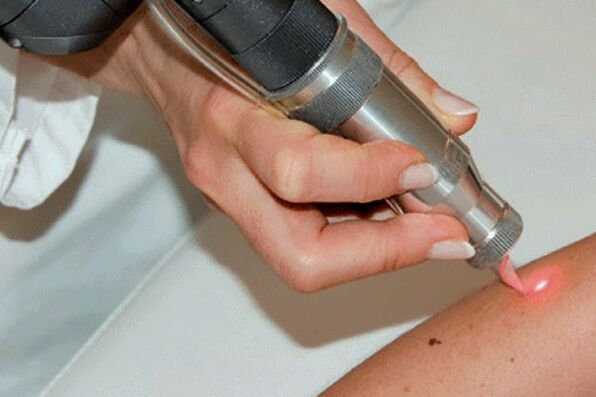
It is worth saying that this method is suitable even for women who have not given birth, because the laser can completely destroy the pathological focus and at the same time it will never provoke coarsening of the tissues of the cervix. Do not perform laser treatment during menstruation. After the advent of this technique, people stopped being afraid of papillomas. How to get rid of them became clear to everyone.
Elimination of growths with liquid nitrogen
Cryosurgery is a procedure in which a specialist applies liquid nitrogen to the wart. This leads to the fact that the neoplasm is cooled to a temperature of -196 degrees. Removal of papillomas by cryodestruction provokes the formation of ice crystals in the tumor and metabolic disorders in it.
Is it possible to remove papillomas at home? Yes. To do this, you need to buy a special kit for cryodestruction in a pharmacy. How to remove papillomas on the body yourself is written in the instructions. The procedure is absolutely painless and therefore does not require the introduction of anesthetics.
During cryodestruction, the specialist dips a special applicator into liquid nitrogen, after which he applies it to the papilloma. After some time, the wart begins to turn black and eventually disappears by itself.
The disadvantages of cryodestruction include its not very high efficiency. So, with large extensive skin lesions, in order to get rid of papillomas on the body, several procedures are necessary. In addition, in the process of papilloma removal, the doctor cannot fully control the depth of exposure. It is for this reason that large warts may require several treatments. At the same time, if you remove small warts, the effect of liquid nitrogen may be too deep, as a result of which scars will remain on the body.
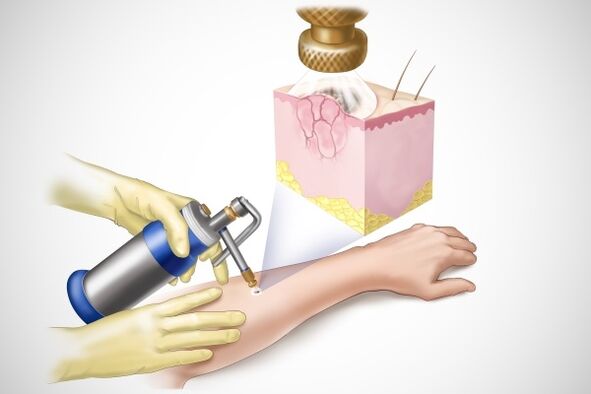
Surgical excision of a neoplasm
In this case, the papilloma is simply cut off with a scalpel. Before removing papillomas on the bodies of patients in this way, the doctor gives the patient anesthesia. At the end of the operation, a tight sterile bandage is applied to the wound.
Does it hurt to remove papillomas this way? Yes, so doctors had to almost completely switch to using other methods. Today, a more modern version of surgical treatment is offered, which allows the removal of papillomas on the body with a laser scalpel. The advantage of this method is that the risk of bleeding and infection is reduced in the patient (the laser seals the damaged vessels).
This procedure is considered less traumatic, but at the same time it allows you to remove neoplasms of any shape, size and at any depth.
Chemical cauterization of the wart
Chemical cauterization of papillomas is a good way to get rid of HPV. This is a procedure in which the doctor applies an HPV-destroying drug to the surface of the tumor, which causes the process of necrosis in the wart. After the procedure, a crust forms at the site of the papilloma, which after a few days falls off the body on its own.
It is impossible to tear or scratch this crust, as in the future this can lead to the formation of rough scars. Before removing papillomas on the body with this method, the doctor performs anesthesia.

If there are papillomas on the body, is it possible to remove them yourself?
Chemical cauterization of papilloma requires high professionalism, therefore, removal of papilloma on the body should be carried out only in medical institutions. Only the doctor knows which medicines to choose for the treatment of the patient in a particular case. For example, to eliminate common or plantar warts, it is better to use medicines based on salicylic acid, and to remove filiform neoplasms or genital warts, it is better to use Spanish fly extract. To eliminate neoplasms in the intimate area, a drug with podophyllotoxin and an acid-based agent are used.
If it is not possible to cauterize the papilloma by applying a chemical solution to it, the doctor may recommend the introduction of a cytostatic glycopeptide antibiotic directly into the lesion itself.
Disease prognosis
After carrying out any modern procedures for the removal of neoplasms, papillomas disappear completely. However, the removal of papillomas is only the elimination of the symptoms of the disease, the very same reason (low immunity and, as a result, a high concentration of the virus) still remains. Therefore, after the removal of growths, patients are prescribed antiviral drugs and immunostimulants.
It is best to remove papillomas when it is summer or winter outside, as the weather is often damp in autumn and spring, which will interfere with wound healing.
How to get rid of papilloma is now clear, but how to keep this effect? It is important to say that it is completely impossible to get rid of the human papillomavirus. Even after completing the full course of treatment, the risk of recurrence of the pathology remains forever. In order to avoid recurrence of the disease, it is recommended to strengthen the body: harden, play sports, have more time to relax and be in the fresh air, lead a proper lifestyle, eat a balanced diet and take vitamin and mineral complexes.
If the neoplasms reappear, you should consult a specialist. He knows why papillomas appeared and how the patient can get rid of them forever. He will also be able to tell if warts need to be removed in a particular case.


















